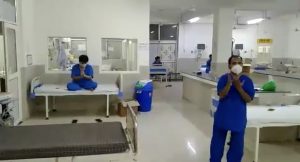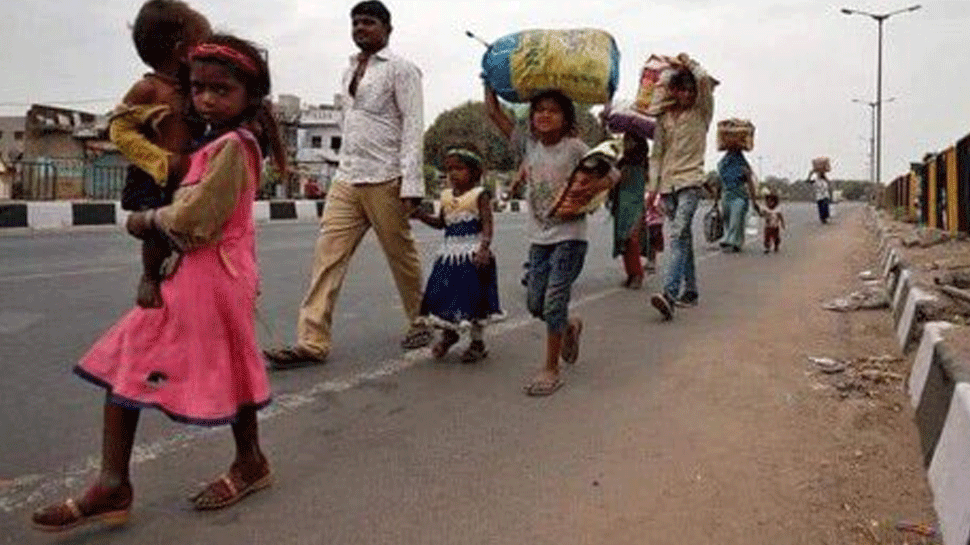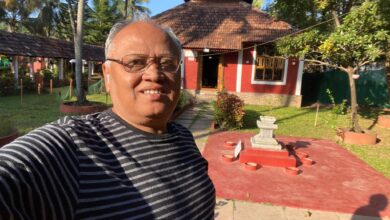Covid-19 pandemic : Empathy Should Be the Guiding Principle

Mohd. Naushad Khan from Delhi
Our fight against Covid-19 pandemic should remind us of what Brene Brown had once said, “Empathy is simply listening, holding space, withholding judgment, emotionally connecting, and communicating that incredibly healing message of you’re not alone.” This healing message will surely helps us to win the battle against Covid-19. It is also important to understand that migrant’s pain is as meaningful as your own by the people and the government and this spirit will help us to fight against Covid-19 effectively.
Empathy has always been the guiding parameters of care and affection. It becomes paramount during any kind of health crisis and particularly like Covid-19 pandemic which we are fighting today. During social distancing, emotional attachment should become vital and here empathy has to play an important role to minimize the level of detachment, anxiety, trauma and feeling of loneliness and isolation. Empathy at this juncture should be the hope for patients, the despair, elderly, children, destitute, marginalized and the migrant workers in particular. Empathy should also guide our behaviour at personal and professional level during the pandemic if we really wish to win the long drawn battle. —
The lockdown and extension plan has affected the life of one and all. It is also likely to impact further in many ways and under such circumstances it is expected that many would come out successfully while it is also anticipated that many in the due process could also give up. Apart from all other aspect which the government is trying to take care of during the pandemic the emotional quotient cannot be simply ignored and it can be best taken care of with empathy and care.

Labourers are an important component of an industry and migrant labourers are the most profitable in terms of production, growth and profit. As a result every industry focuses low-cost productivity, and maximum return. Therefore migrant labourers are the most sought-after in every state and in every country as well. Migrants move out of their respective state in search of livelihood but for industries they are the cheap labour force that can be helpful in ensuring low-cost production and maximum profit. Any loss out of migrant exodus from different parts of India may not be the only loss of the individual state, but the loss of the nation at large. In this regard, people should be made to realise that migrant workers are the asset and not the burden and treated accordingly with empathy. In other words, empathy should be the guiding principle to address migrant crisis.
Today the biggest sufferers are the migrants and it is this area which requires special attention and care. The big question: Are we really sensitive to the plight of migrants during Covid-19 pandemic? It is a matter of record that since the national CoVID-19 lockdown, now in its third phase, labourers have faced massive job loss and do not have food and health security at the cities they work in. Thousands have been walking to their villages from across the country without anything except for the desire to return to their families and loved ones. Many have died on the way too. It is now being seen as one of the biggest humanitarian crises in India, emerging in the wake of the Covid19 pandemic.
Post the Partition of 1947, this is the first time India witnessed a tragedy with such a massive human cost. Already hit by joblessness and facing impending starvation in the cities they work in, thousands of labourers had hoped to get home safely in the special trains run by the Railways for the purpose. To their shock they were expected to pay the fare which was no less than making mockery of their plight. The only solution to avert this crisis is by responding with concrete measures and empathy to everyone’s distress and needs. Certain basic rights should be guaranteed to all citizens – the right to food, the right to work at minimum wages and equal access to healthcare.
Taking pride of the services rendered by our doctors, nurses, ward boys, policemen and all officials on duty to help the people in need and the feeling of the risk they are taking to save our lives and cheering them up, lauding their efforts is also a gesture of empathy towards them. Empathy could be the only panacea to deal with any kind of emotional and psychological impact which may not be visible but its impact would be deep rooted and may take years or even decades to heal up.
Ajay Shankar Pandey, district magistrate (DM) of Ghaziabad has set an example as to how to empathize with the Covid-19 positive patients. He is making phone calls daily and talking to Covid-19 positive patients to build hope and confidence in them. He is also coordinating with the family members and trying to make the patients psychologically strong so that the patient can respond positively to the treatment. As a step forward, all the district magistrate should take initiatives that can build the hope and confidence of the Covid-19 positive patients.
Ajay Shankar Pandey, district magistrate (DM) of Ghaziabad has set an example as to how to empathize with the Covid-19 positive patients. He is making phone calls daily and talking to Covid-19 positive patients to build hope and confidence in them. He is also coordinating with the family members and trying to make the patients psychologically strong so that the patient can respond positively to the treatment. As a step forward, all the district magistrate should take initiatives that can build the hope and confidence of the Covid-19 positive patients.
According to Dr. Mahboob Ali Khan, PhD Quality Consultant, Ministry of Higher Education, University of Dammam, “Empathy is also considered to be an essential quality to be an effective leader. When challenged or confronted about an issue, our default behaviour is to be defensive and present factual counter arguments. But doing this doesn’t give us the chance to really connect as humans and understand, at an emotional level, what is being said to us and why. “A crisis brings out the best and the worst in people. Your skill in being able to empathise, communicate with and support those around you will say a lot about you and your abilities.
“Given the unprecedented level of stress we’ve all been under with Covid-19, it’s important to recognise and practice the type of communications techniques that are useful to help diffuse potential conflicts in both our personal and professional lives. I know the importance of mental resilience, of balanced and “zoomed out” thinking but I’d be the first to say that, at times, I’ve got overwhelmed and I haven’t remembered to dip into my toolbox,” he said.
Mahboob adds: “What has pulled me back on track is the daily habit of taking time to reflect on who I want to be in the world and what that would look like. The other great help has been connecting with my networks of family, friends and contacts. They have been truly remarkable, putting their arms around me virtually and giving me perspectives to help shine a dim light of positivity through unprecedented uncertainty. Most of us are trying to put structures in place that create a sense of normality in both our personal and professional lives. But the “new normal” means being cooped up in our homes, sometimes with children who aren’t at school, while trying to work and deal all too often with stressed customers, colleagues and contacts.”
“Fear, frustration, panic, anger, confusion … we have all been dealing with these emotions and many others during the COVID-19 pandemic. The amount of media attention, whether social media, news media, keeps these emotions at or near the surface seemingly all the time. Our way of life has been impacted in ways we never anticipated or imagined. As a result of these significant disruptions, it is crucial for all of us to demonstrate empathy in each and every encounter — for our patients, our coworkers and for ourselves,” said Dr. M. Wasim Ghori – Medical Director, Heart & Diabetes Clinics, and Mumbai & Fellow – Royal Society of Public Health, FRSPH, UK.

“Empathy is the willingness to put oneself in another’s situation and imagine their physical and emotional needs. How does that apply to our patients now, during the COVID-19 pandemic? It is more crucial than ever that we remain calm during the storm. For our patients, we can act with empathy by simply being there to serve them … showing up. The more we can provide a sense of normalcy, the more we ease their fears. Life is disrupted, but we can provide stability. It is important to remember that acknowledging patients’ emotion does not need to include matching their emotion. Patients may be frustrated and angry, but we can and must greet them with a sincere smile and a warm “hello.” Social distancing does not have to mean emotional disconnection,” he said.
“Furthermore, many institutions and countries have focused their science on COVID-19 to develop new vaccines and drugs. Emergency and intensive medical care have become essential more than ever, digital health has also become a cornerstone of the collective response to the pandemic as people stay at home and practice social distancing. At some point, this pandemic will be over and our lives will get back to normal, but our families, friends, coworkers and patients will remember how we responded and treated one another. This is our time to build a legacy of empathy, grace and self-awareness in times of Corona and beyond,” added Ghori.
Dr. N. Motlekar – Chief Intensivist, Holy Spirit Hospital, Mumbai said, “Empathy is always important, but it is particularly vital during a public health crisis. Practicing empathy during the COVID-19 pandemic not only opens your mind to what others are experiencing, but it can also provide social connectedness that can help combat feelings of isolation. During a large-scale event, it is important to remember that everyone is in this together—thinks of others, reach out however you can and remember to ask for help if you need it.”

Motlekar added, “Over the past few decades, empathy—the ability to take on the perspective, or “feel” the emotions, of another person—has been touted as a key clinical skill, and a cornerstone of the doctor-patient relationship. Communication with and trust in the doctor hinges on this quality, right along with patient satisfaction and clinical outcome of the treatment itself. Many physicians are now trained to be empathetic, but still struggle with showing empathy all day, every day. After all, physicians are only human, prone to exhaustion and stress, and simply not empathetic all the time. The proposed solution is simple: fake it till you make it; even if you don’t feel empathetic with your patient, you should at least give the impression that you are.”





